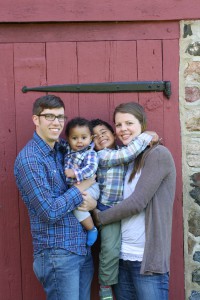 Some of my favorite parts of the day are when my husband and I get down on the floor with our sons to wrestle and play, hearing them belly laugh. Or when I lie down for sleep with two tired, little boys snuggled tight under my arms.
Some of my favorite parts of the day are when my husband and I get down on the floor with our sons to wrestle and play, hearing them belly laugh. Or when I lie down for sleep with two tired, little boys snuggled tight under my arms.
Since we started our adoption journey four years ago, we have received so much joy and love from our sons and their birth mothers. However, it’s bittersweet…for although it’s true that there are countless joys and benefits from building families through adoption, there’s also inherent sorrow and loss resulting from separation from their birth mothers — they who had comforted them in the womb and held them during those first wakeful moments.
For some adopted children, this loss of a birth mother can have profound effects on their sense of personal security and ability to trust others. Undertones of anxiety and apathy may affect their relationships with loved ones. Furthermore, children who have experienced prenatal and perinatal trauma and loss may display even stronger, more vivid emotions of fear or anger when exposed to stress in the future. Adoptive parents, being aware of these potential challenges and facing them head-on, is one key to the child’s successful bonding, growth and development.
When we brought our sons home from the hospital, we couldn’t verbally make them understand that both we and their birth mothers love them immensely. However, we could — and did — use nonverbal communication to express our love and commitment to them.
We did skin-to-skin contact, laying them on our skin and allowing us to connect without words. We also chose to respond quickly to their cries by holding them close and reassuring them that we will always come when they need us.
Babywearing became an essential aspect of early bonding, especially with our second son. Life became noticeably busier with two young children. Both need love and special attention, and babywearing allows me to keep my little one close while still freely interacting with my older son. I can provide simultaneous security to both of my children.
These forms of physical contact are categorized as nurturing touch by Attachment Parenting International (API). When words are difficult, as is the case with newborns and young children, nurturing touch transcends language while still communicating security and love. It involves everything from massage to physical play and can be as simple as putting your arm around your child while on the couch together.
As our sons continue to grow, we are finding other ways to deepen this connection. Our 3 year old loves to wrestle and pillow fight. Each night, we happily indulge him to meet his need for physical contact, helping him to build trust and confidence in us and himself. Later, at bedtime, I lay next to him and rub his back through stories and prayers. He craves this connecting, nurturing touch and the security of knowing that we love him immensely.
Parents can never undo the loss that some adopted children experience, but hiding or not acknowledging it can be detrimental to them. Being aware of these challenges and meeting them with
persistent affection and honesty can allow healing to take place.
My husband and I are so blessed to have two happy, spirited and loving sons. Looking back, I am confident that much of our boys’ smiles, laughter and love are due to our decision to follow API’s Eight Principles of Parenting. There is so much unique joy experienced in adoption, and connections formed through nurturing touch foster this joy — allowing our children to feel secure and build necessary, lasting trust in us.

2 thoughts on “Nurturing touch restores security in adoptive families”